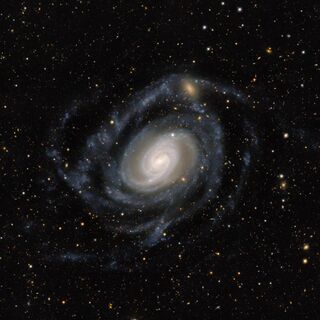Astronomy:NGC 289
| NGC 289 | |
|---|---|
 Hubble Space Telescope image of NGC 289 | |
| Observation data (J2000 epoch) | |
| Constellation | Sculptor |
| Right ascension | 00h 52m 42.365s[1] |
| Declination | −31° 12′ 20.99″[1] |
| Redshift | 0.0054[2] |
| Helio radial velocity | 1,628 km/s[3] |
| Distance | 76.1 Mly (23.33 Mpc)[3] |
| Apparent magnitude (V) | 11.0[4] |
| Apparent magnitude (B) | 11.4[2] |
| Characteristics | |
| Type | SB(rs)bc[5] |
| Apparent size (V) | 3.1' x 2.5'[4] |
| Other designations | |
| MCG -05-03-010, IRAS 00502-3128,[2] PGC 3089, 2MASSX J00524236-3112209 | |
NGC 289 is a spiral galaxy in the southern constellation of Sculptor, located at a distance of 76 megalight-years from the Milky Way.[3] It was discovered on September 27, 1834, by John Herschel. The compiler of the New General Catalogue, John Louis Emil Dreyer, noted that NGC 289 was "pretty bright, large, extended, between 2 considerably bright stars".[4] The plane of the galaxy is inclined by an angle of 45° to the line of sight from the Earth.[5]
This is a Type II Seyfert galaxy with an active galactic nucleus. A dust lane is seen crossing the nucleus, and there are indications of recent starburst activity nearby.[6] NGC 289 is a giant, gas-rich, low surface brightness galaxy with a small bulge at the nucleus, a small central bar, and two inner spiral arms. These arms split into multiple parts as they extend into the outer disk. The galaxy has a dark matter halo that has an estimated 3.5 times the mass of the gaseous and stellar components. There is a dwarf elliptical companion to the north of the galaxy,[7] designated Arp 1981,[6] that may be having a perturbing influence.[7]
Gallery
-
Spiral Galaxy NGC 289 taken at ChileScope Observatory (W76), near Ovalle, Chile. Image courtesy Adam Block.
-
Hubble Space Telescope image of NGC 289
References
- ↑ 1.0 1.1 Skrutskie, Michael F.; Cutri, Roc M.; Stiening, Rae; Weinberg, Martin D.; Schneider, Stephen E.; Carpenter, John M.; Beichman, Charles A.; Capps, Richard W. et al. (1 February 2006). "The Two Micron All Sky Survey (2MASS)". The Astronomical Journal 131 (2): 1163–1183. doi:10.1086/498708. ISSN 0004-6256. Bibcode: 2006AJ....131.1163S.
- ↑ 2.0 2.1 2.2 "NGC 289". SIMBAD. Centre de données astronomiques de Strasbourg. http://simbad.u-strasbg.fr/simbad/sim-basic?Ident=NGC+289.
- ↑ 3.0 3.1 3.2 Tully, R. Brent et al. (2016). "Cosmicflows-3". The Astronomical Journal 152 (2): 50. doi:10.3847/0004-6256/152/2/50. Bibcode: 2016AJ....152...50T.
- ↑ 4.0 4.1 4.2 "New General Catalog Objects: NGC 250 - 299". http://cseligman.com/text/atlas/ngc2a.htm.
- ↑ 5.0 5.1 Pence, W. D.; Blackman, C. P. (October 1984). "Gas dynamics in barred spiral galaxies - II. NGC 7496 and 289". Monthly Notices of the Royal Astronomical Society 210 (3): 547–563. doi:10.1093/mnras/210.3.547. Bibcode: 1984MNRAS.210..547P.
- ↑ 6.0 6.1 Smajić, Semir et al. (May 2013). "The central kpc of edge-on AGN". ePrint. Bibcode: 2013arXiv1305.4938S.
- ↑ 7.0 7.1 Walsh, Wilfred et al. (May 1997). "The Giant, Gas-Rich, Low-Surface-Brightness Galaxy NGC 289". Astronomical Journal 113: 1591–1606. doi:10.1086/118377. Bibcode: 1997AJ....113.1591W.
External links
 |


